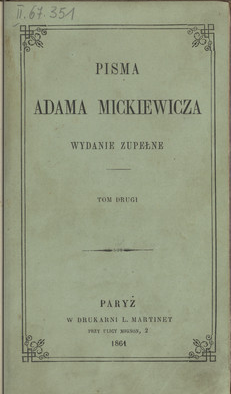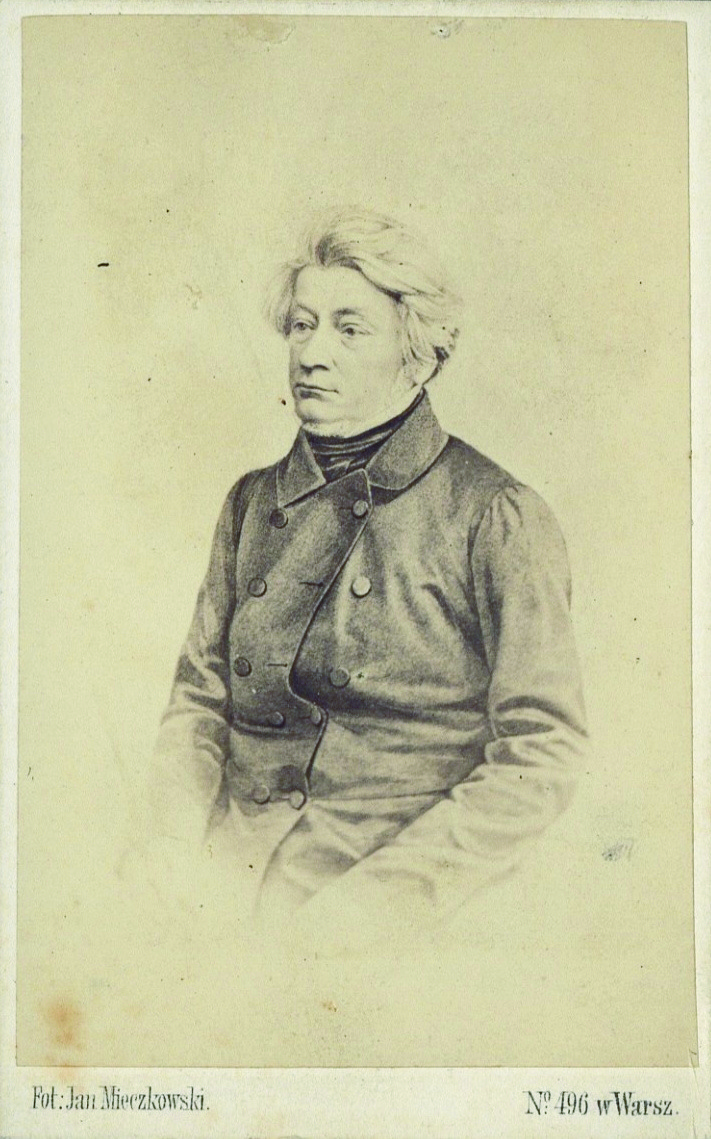Title of the work
Country of the First Edition
Country/countries of popularity
Original Language
First Edition Date
First Edition Details
Chłop i żmija and Pies i wilk in: Adam Mickiewicz, Tłumaczenia wierszem. Księgi Narodu i Pielgrzymstwa Polskiego. Pisma Rozmaite. Ed. Pisma Adama Mickiewicza. Na nowo przejrzane, dopełnione, i za zezwoleniem jego w tem siódmem s kolei wydaniu do druku podane. Tom IV. Paris: Bourgogne et Martinet, 1844, 308 pp.
Powiastki i bajki in: Pisma Adama Mickiewicza. Wydanie zupełne. Tom pierwszy. Paryż: L. Martinet, 1861, 500 pp.
Available Onllne
Ed.1844: polona.pl, Chłop i żmija, p.112, Pies i wilk, p. 114, (accessed: September 28, 2020).
Ed. 1861: polona.pl, Powiastki i bajki, p. 169 (accessed: September 28, 2020).
Genre
Fables
Target Audience
Crossover (Children)
Cover

Biblioteka Narodowa, rights: public domain.
Author of the Entry:
Summary: Małgorzata Glinicka, University of Warsaw, muktaa.phala@gmail.com
Analysis: Marta Pszczolińska, University of Warsaw, m.pszczolinska@al.uw.edu.pl
Peer-reviewer of the Entry:
Katarzyna Marciniak, University of Warsaw, kamar@al.uw.edu.pl
Elżbieta Olechowska, University of Warsaw, elzbieta.olechowska@gmail.com

Photograph by Jan Mieczkowski (1830–1889), retrieved from Wikimedia Commons.
Adam Mickiewicz
, 1798 - 1855
(Author)
A Polish national poet, political writer, dramatist, essayist, and translator; one of the most prominent authors of the Polish Romantic period, the eldest of the “Three National Bards,” next to Juliusz Słowacki (1809–1849) and Zygmunt Krasiński (1812–1859).
Born December 24, 1798 in Zaosie or Nowogródek in the former Polish-Lithuanian Commonwealth at that time under Russian control (now in Belarus). Educated at a Dominican school in Nowogródek, later – in 1815 – attended the Imperial University of Wilno (Vilnius). Founded a secret Philomath Society in 1817 (with another poet and activist Tomasz Zan); its purpose was self-education, scientific research work, educative and political activity within the academic environment. While the organization focused on the development of the individual, it was connected to a more politically oriented student group, Philareth Association. Arrested in 1823 or 1824, Mickiewicz was exiled to Russia, where he was able to travel and stay in Saint Petersburg, Moscow and Crimea; he also made quite a few eminent friends, including the famous Russian poet, Alexander Pushkin. After five years of exile, the poet travelled abroad, to Weimar, Berlin, Prague, Rome, Dresden, Leipzig, and Paris. His visit to France was related to several very important events: the outbreak of the November Uprising (1830–1831); marriage to Celina Szymanowska (1834); meeting with the philosopher Andrzej Towiański (1835) and the subsequent adoption of Towiański’s ideas of Polish Messianism and religious mysticism; taking the position of lecturer at the Collège de France, Chair of Slavic Languages. In 1849 Mickiewicz founded a French newspaper La Tribune des Peuples. He died November 26, 1855 having contracted cholera in Constantinople where he went to organize Polish military forces in relation to the outbreak of the Crimean War.
Mickiewicz made his debut with the poem Zima miejska [City Winter], 1818, published in Tygodnik Wileński [Vilnius Weekly]. His numerous poems include: Oda do młodości [Ode to Youth], 1820; a collection of poems Ballady i romanse [Ballads and Romances], 1822; Grażyna, 1823; Sonety krymskie [Crimean Sonnets], 1826; Konrad Wallenrod, 1828; Księgi narodu polskiego i pielgrzymstwa polskiego [Books of the Polish Nation and Polish Pilgrimage], 1832; the national epic poem Pan Tadeusz, czyli ostatni zajazd na Litwie. Historia szlachecka z roku 1811 i 1812 we dwunastu księgach wierszem [Sir Thaddeus, or the Last Lithuanian Foray. A Nobleman’s Tale from the Years 1811 and 1812 in Twelve Books of Verse], 1834, and a drama in verse Dziady [Forefathers’ Eve], in four parts, 1822–1860.
Sources:
Dernałowicz, Maria, Adam Mickiewicz, Warszawa: Wiedza Powszechna, 1985.
Makowski, Stanisław and Eligiusz Szymanis, Adam Mickiewicz, Warszawa: Wydawnictwa Szkolne i Pedagogiczne, 1992.
Bio prepared by Małgorzata Glinicka, University of Warsaw, muktaa.phala@gmail.com
Summary
Based on: Katarzyna Marciniak, Elżbieta Olechowska, Joanna Kłos, Michał Kucharski (eds.), Polish Literature for Children & Young Adults Inspired by Classical Antiquity: A Catalogue, Faculty of “Artes Liberales”, Warsaw: University of Warsaw, 2013, 444 pp.
The book includes several fables without direct ancient references but often in fable tradition and as such having ancient roots, for example: Przyjaciele [Friends], Pchła i rabin [The Flea and the Rabbi], Dzwon i dzwonki [A Big Bell and Little Bells], Żona uparta [A Stubborn Wife], Golono, strzyżono [Either Shaving or Trimming], Koza, kózka i wilk [The Goat, the Kid and the Wolf].
However, the remaining fables are based on specific fables by Aesop (7th– 6th century BC), an ancient Greek fabulist, although some through the intermediary of the French author Jean de La Fontaine.
The story Żaby i ich króle [The Frogs and Their Kings, Aesop’s fable known under the title The Frogs Who Desired a King] presents frogs living in leaderless anarchy, while all quadrupeds, birds or bees have a ruler. The frogs pray to Jupiter begging him, the lord of Gods, for a king. Jupiter first gave them the tiny Kij Kijowicz [Twiggy Twig], who was a weakling and lacked authority. Discontented with such incompetent and weak ruler, the frogs repeatedly asked Jupiter for a new master. The god granted their wish and sent a serpent proficient at crawling, swimming, eavesdropping, noticing everything, able to reach places under water, stones and tree trunks, searching for wrong–doings and punishing aristocracy and humble folk alike, the loud and the silent. Although citizens begged the god to change the ruler again, he refused to heed them.
In the fable Chłop i żmija [The Peasant and the Viper, Aesop’s fable known as The Farmer and the Viper], the author refers to Aesop including the story about a merciful peasant, who took pity on a frozen and frost covered viper. When the reptile’s health improved, it attacked its savior who got angry and killed it.
In another story, Pies i wilk [The Dog and the Wolf, Aesop’s fable known by the same title], also known from La Fontaine’s collection, a famished wolf admires the appearance of a well-fed dog. The dog gives an enthusiastic description of his comfortable and safe life, inviting his interlocutor to join him in serving people by keeping watch on a courtyard, announcing arrival of guests, barking and flattering the masters. After some time the wolf asks why the fur around the dog’s neck is worn away. The dog replies that it is caused by the collar worn during the night-time. This alerts the wolf who leaves him, declaring that a full belly is not as precious as liberty.
Analysis
Mickiewicz’s Bajki [Fables] have their source in the long European and Polish tradition deriving from Aesop’s collection of fables. The author himself described them as “(fables) from La Fontaine” or “following La Fontaine”, which suggests the source of inspiration was not Aesop or Phaedrus, but rather the contemporarily still fashionable French fabulist. During Mickiewicz’s life, only two of his fables were published: The Peasant and the Viper and The Dog and the Wolf, which were included in the Translations chapter. The entirety of his fables was only later published in the post-mortem edition of collective works in the chapter Powiastki i bajki [Tales and Fables]. Although the author humbly considered some of them to be just translations from La Fontaine, they are largely original. Drawing on older sources and writers, Mickiewicz developed the fables in his own characteristic style, adding new details to give them a more original, Polish overtone, e.g., through incorporating Polish nature or social and traditional elements, but at the same time preserving the core of the Aesopian and La Fontaine’s pattern. Formally, Mickiewicz does indeed resemble La Fontaine and his light and humorous storytelling, the lack of distinct poetic structure: no staves and uneven verses, elongated or shortened, depending on the tempo of the action.
The Frogs and Their Kings preserve the core of Aesop’s fable (accessed: September 28, 2020) as the described situation is the same: frogs ask Zeus/Jupiter for a king and obtain first a stick, then a water snake. What is different is that Mickiewicz develops the plot by creating a scene full of details; he enriches the fable by adding some dialogues and ends the narrative by their new ruler’s oppressive treatment towards them lasting until today, not by him devouring all the frogs. What differs as well is the moral: Aesop says that it is better to be commanded by men who are lazy but without wickedness than by troublemakers and wicked ("Ὁ λόγος δηλοῖ ὅτι ἄμεινόν ἐστι νωθεῖς καὶ μὴ πονηροὺς ἔχειν ἄρχοντας ἢ ταρακτικοὺς καὶ κακούργους".); Mickiewicz’s lesson is that the frogs’ republic still clamors for a new king, while the god refuses to get involved.
The Peasant and the Viper has the subtitle A fable from Lafontaine, but begins (just like its French equivalent) with 3 explicit verses about a fable in Aesop’s collection dealing with a merciful deed of a peasant and a dastardly act of a snake, so the reference is direct. The fable is much longer than the one by Aesop (accessed: September 28, 2020), as it is 34 verses long, not just 4 including the moral. Mickiewicz’s fable is a full story with details and background, described in a lively and witty language. The moral, however, has a slightly different meaning. Aesop writes that evil people do not change, even towards their benefactors ("Ὁ λόγος δηλοῖ ὅτι ἀμετάθετοί εἰσιν αἱ πονηρίαι, κἂν τὰ μέγιστα φιλανθρωπεύωνται".), while Mickiewicz claims that a good man may help an ungrateful person, but that more often the ungrateful perishes ("Przytrafia się to często, że dobry człek jaki / Niewdzięcznika przygarnie; / Ale trafia się częściej, że niewdzięcznik taki / Przepada marnie").
The Dog and the Wolf has the sub-title Imitation of Lafontaine, which seems to be correct, as Aesop’s original (accessed: September 28, 2020) is very short: 3 verses including 1 with the moral. La Fontaine, who used Aesop as his source via Phaedrus (III,7), described the situation as a short genre scene, making storytelling light, humorous, the narration dynamic and fast-paced, full of contemporary French elements. Mickiewicz followed La Fontaine, preserving the form, but introduced Polish details of his times, making the fable less distant from the reader.
Further Reading
Dernałowicz, Maria, Adam Mickiewicz, Warszawa: Wiedza Powszechna, 1985.
Makowski, Stanisław and Eligiusz Szymanis, Adam Mickiewicz, Warszawa: Wydawnictwa Szkolne i Pedagogiczne, 1992.
Aesop’s Βάτραχοι αἰτοῦντες βασιλέα [The Frogs and Their Kings] (accessed: September 28, 2020).
Aesop’s Γεωργὸς καὶ ὄφις ὑπὸ κρύους πεπηγώς [The Farmer and the Viper] (accessed: September 28, 2020).
Aesop’s Λύκος καὶ κύων [The Dog and the Wolf] (accessed: September 28, 2020).
La Fontaine’s Le Villageois et le Serpent (accessed: September 28, 2020).
La Fontaine’s Le Loup et le Chien (accessed: September 28, 2020).
Addenda
The summary based on Bajki [Fables], in: Adam Mickiewicz, To lubię... [I Like This...], Warszawa: Krajowa Agencja Wydawnicza RSW „Prasa–Książka–Ruch,” 1984, 96 pp.


